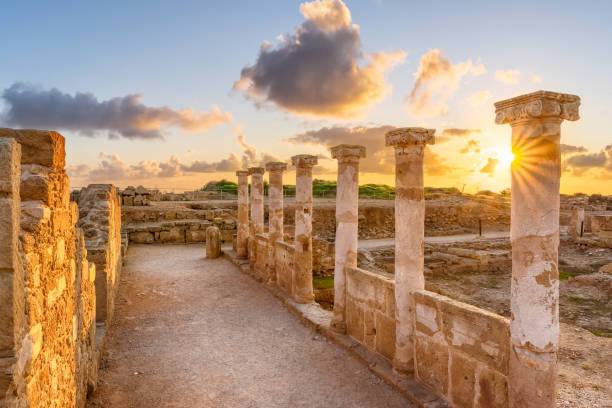Cyprus has a rich and multi-layered history that spans thousands of years. This history includes periods of prosperity and decline, conquests and independence, as well as multicultural interactions that have shaped the unique identity of the island.
Contents
Ancient Times
The history of Cyprus begins in the Neolithic era, around 10,000 BC. The first settlers on the island left numerous archaeological evidence, including pottery and stone tools. In the Bronze Age, Cyprus became an important trading center due to its rich copper mines, which gave the island its Greek name — “Kypros,” meaning copper.
Antiquity
In antiquity, Cyprus became a significant cultural and trading hub in the Eastern Mediterranean. In the 9th century BC, the first Greek colonies, such as Salamis and Paphos, appeared on the island. Later, the island came under the rule of the Assyrians, Egyptians, and Persians until it was conquered by Alexander the Great in 333 BC. After the breakup of his empire, Cyprus became part of the Hellenistic world, governed by the Ptolemaic dynasty.
Roman Period
In 58 BC, Cyprus was annexed by the Roman Empire. This period was marked by stability and prosperity, the development of infrastructure, and the construction of many public buildings and temples, the ruins of which can still be seen today. During this period, the Christianization of the island began, initiated by the apostles Paul and Barnabas in the 1st century AD.
Byzantine Period
After the fall of the Roman Empire, Cyprus became part of Byzantium. This period was characterized by frequent Arab raids, which led to the creation of defensive structures such as castles and fortresses. The Byzantine period also saw the construction of numerous churches and monasteries, many of which have survived to this day.
Middle Ages
In 1191, Cyprus was conquered by Richard the Lionheart during the Third Crusade and was soon sold to the Templars and then to the King of Jerusalem, Guy de Lusignan. This began the Lusignan era, which lasted until 1489 when the island came under the rule of the Venetian Republic. The Venetians fortified the island, building strong fortifications such as the walls of Nicosia and the fortress of Famagusta.
Ottoman and British Periods
In 1571, Cyprus was conquered by the Ottoman Empire and remained under its control until 1878 when the island was handed over to Britain. British rule brought modernization of infrastructure but also became a period of political tension and nationalist movements among Greek Cypriots, who sought ensues (union with Greece).
Independence and Modern Events
In 1960, Cyprus gained independence from Britain. However, interethnic conflicts between Greek and Turkish Cypriots led to UN intervention and the division of the island in 1974 following a Turkish invasion. The northern part of the island was declared the Turkish Republic of Northern Cyprus, which is recognized only by Turkey.
The history of Cyprus is a story of encounters and interactions between various cultures and civilizations. Despite the complex and often tragic moments in its history, Cyprus remains a symbol of resilience and cultural richness, attracting tourists and researchers from all over the world. Today, Cyprus continues to develop as an independent state, striving for unity and prosperity.
















